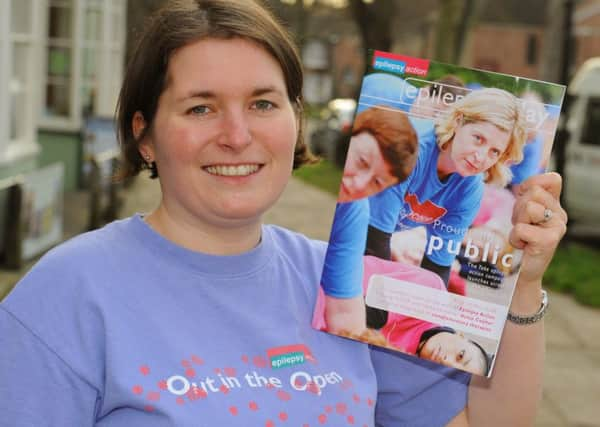Reporter's plea for public to learn more about epilepsy


During National Epilepsy Week (May 15 to 21) the charity wants everyone from social care workers and teachers to doctors and nurses to equip themselves with the tools they need to help someone having a seizure.
Anna, who has had the condition for more than 20 years, said: “I’ve seen attitudes change and people have become more understanding, but there are still so many misconceptions even within the medical profession.
Advertisement
Hide AdAdvertisement
Hide Ad“There are more than 40 different types of seizure and none of the ones I’ve experience are the stereotypical convulsion where someone falls to the ground and shakes.
“Someone seeing one of mine may not even realise it’s epilepsy. I look like I’m hyperventilating or just really out of breath.
“Within a minute I’m back to normal as if nothing has happened.
“Many people do not realise flashing lights triggers seizures in only three percent of patients.”
Advertisement
Hide AdAdvertisement
Hide AdEpilepsy affects 84,000 people in the south east and 87 people in the UK are diagnosed every day – a total of 32,000 new cases each year.
Seizures can be controlled with medication, but in a third of cases full seizure freedom is not possible with medication alone and other options have to be explored.
Anna underwent brain surgery six years ago and as a result now has fewer and less severe seizures.
She said: “Many people including myself live an independent life with the condition. Even before the operation I was able to, go out to work, go to university away from home and travel on my own. Of course that has its benefits, but it also masks how much it can affect your daily life - even during times of seizure freedom.”
Advertisement
Hide AdAdvertisement
Hide AdResearch by Epilepsy Action reveals at one in five people with epilepsy are uncomfortable talking about it even with their friends.
This week the charity is encouraging people to read its range on online learning resources aimed at helping teachers, health and social care professionals and members of the public feel confident looking after someone with epilepsy.
It also offers an online course to people with epilepsy to help them better manage their symptoms.
Philip Lee, chief executive at Epilepsy Action, said: “Epilepsy is about so much more than having seizures.
Advertisement
Hide AdAdvertisement
Hide Ad“Low self-esteem, social isolation and gaining employment can be just some of the issues which people with epilepsy have to deal with. As a result, many people feel uncomfortable talking about their condition for fear of discrimination or feeling embarrassed.
“We want to change that and help people to feel able to talk more openly about their epilepsy.
“We can only achieve this by improving the public’s knowledge and understanding of the condition and how it impacts on people with epilepsy and their families.
“By taking just a few minutes to learn about the condition, you could be helping someone with epilepsy to feel safer, more supported and less isolated.
Advertisement
Hide AdAdvertisement
Hide Ad“This can have a dramatic impact on their self-esteem and quality of life.”
Epilepsy Action is also offering 50 new charity e-memberships during the week.
It also provides support through its freephone and email helpline as well as online information and e-learning.
For more information about National Epilepsy Week, including details of how to get involved and what support is available, visit epilepsy.org.uk/epilepsyweek or call the Epilepsy Action freephone helpline on 0808 800 5050.